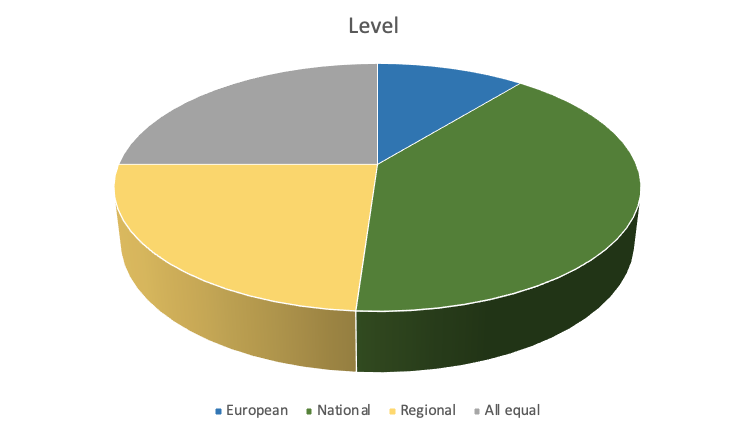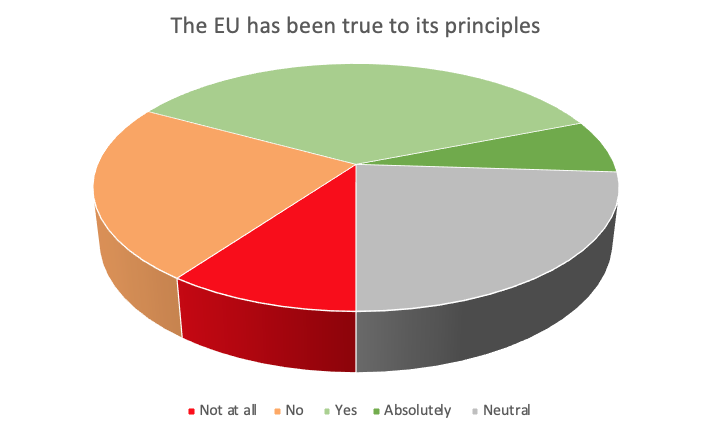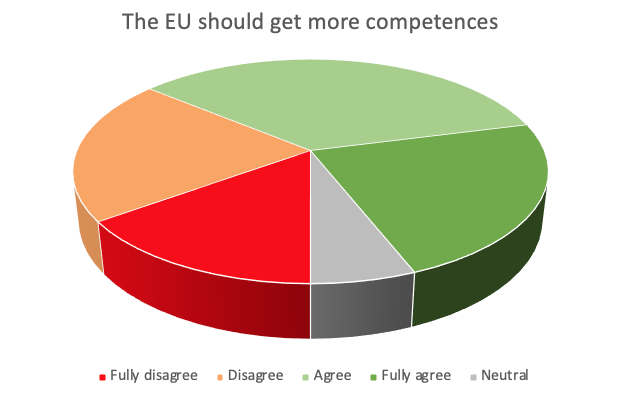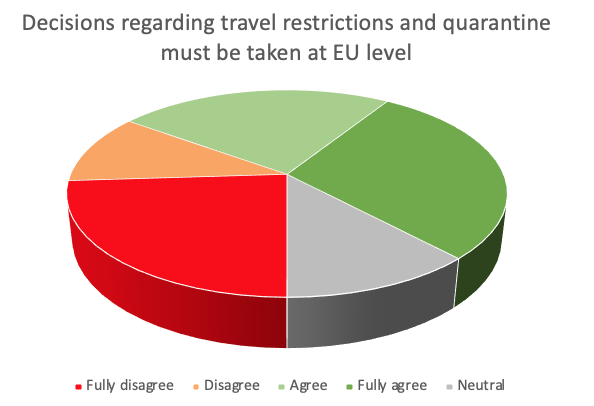Well done Brussels?
How did the EU handle the Corona crisis?
In the last weeks, EU Watch conducted a survey about the EU’s handling of the Covid-19 pandemic. We wanted to know what YOU think.
The online questionnaire was open from mid-March to mid-April 2021. Well over 100 people, among them both experts on European affairs, journalists, policy-makers in the European Parliament, but also ordinary citizens, participated and shared their views and insights with us. While this poll does not claim to be representative, it shows what we believe are some important trends. Following is a summary of the main findings.
- A majority of Europeans expect the EU to deliver a Europe-wide, coordinated response to the pandemic, instead of leaving key issues to member states or lower levels of government.
- While 53 percent of respondents in our survey were satisfied with the EU’s efforts of maintaining a free flow of goods in the Internal Market (20 percent weren’t), the opposite was true when it came to maintaining free movement: 29 percent were very dissatisfied and another 29 percent somewhat dissatisfied with the EU in that respect. The survey reflects the high value participants attribute to key aspects of the EU, notably freedom of movement of persons, goods and services, and the abolition of borders.
- On the vaccination campaign, a large majority (68 percent) said it was right that the negotiations with the pharmaceutical companies was handled by the European Commission. However, three out of five respondents said the EU should have invested more money into vaccine research and even more (65 percent) said the Commission acted too slowly in its negotiations with the companies.
- On the market authorisation of the vaccines, 50 percent agreed with the Commission’s approach and only 34 percent said they should have been approved faster.
- Opinion is divided over whether or not the EU should gain further powers to deal with future pandemics. In our survey, 43 percent said they agree with strengthening the EU vis-à-vis the national interests, 36 percent said they don’t. While 47 percent of respondents said the position of the European Parliament must be bolstered, 65 percent want the Commission to become stronger.
- In contrast, most respondents believe that national governments should have less of a say in comparison with the EU level. Furthermore, 58 percent said that the EU should gain more competences in the area of health policy in order to deal better with future pandemics.
- Two thirds of all respondents said that the criteria for lockdowns and the rules for quarantine should be harmonised at EU level, preventing a patchwork of different rules across the Union.
Summary of survey responses
Time frame: March/April 2021
Languages: English, French, German, Italian
Respondents: 110
Method: Online
1. Since the outbreak of the COVID-19 pandemic, decisions at which political level have first and foremost affected your professional situation?
10% European level
37% national level
22% regional
23% all to the same extent

2. To what extent are you satisfied or dissatisfied with the EU’s handling of the following aspects of the pandemic?
Vaccine development
23 % very dissatisfied
24 % dissatisfied
23 % satisfied
21% very satisfied
Vaccine procurement/purchasing and distribution
37% very dissatisfied
32% dissatisfied
11% satisfied
1% very satisfied
Maintaining the free movement of goods within the EU:
11% very dissatisfied
9 % dissatisfied
41 % satisfied
12 % very satisfied
Maintaining the free movement of people within the EU
24% very dissatisfied
30% dissatisfied
19 % satisfied
13% very satisfied
Coordinating the free movement of people within the EU
29% very dissatisfied
29 % dissatisfied
15 % satisfied
2% very satisfied
Economic support for businesses in need
10% very dissatisfied
21% dissatisfied
25% satisfied
8% very satisfied
3. Overall, the EU has been true to its values and principles during the pandemic. Do you agree or disagree?
10% not at all
23% By and large, no
36% By and large, yes
7% Absolutely

4. In the spring of 2020, the 27 EU member states decided to pool their efforts in developing and ordering vaccines against Covid-19. This may have been one of the reasons why the vaccines were delivered later than to other countries. With hindsight, how do you assess the EU’s vaccination drive?
The EU should have left it to the member states to negotiate contracts with vaccine producers
11% fully agree
12% agree somewhat
28% disagree somewhat
40% disagree completely
The EU should have spent more money for research into vaccines:
35% fully agree
24% agree somewhat
19% disagree somewhat
3% disagree completely
The EU should have negotiated faster even if that meant paying more for vaccines
44% fully agree
21% agree somewhat
21% disagree somewhat
11% disagree completely
The EU should have cut the approval process for new vaccines
16% fully agree
18% agree somewhat
23% disagree somewhat
27% disagree completely
The EU should have put more pressure on vaccine manufacturers to deliver the doses that were ordered
50% fully agree
27% agree somewhat
9% disagree somewhat
5% disagree completely
The procurement negotiations should not have been handled by the European Commission, but by more experienced persons
29% fully agree
31% agree somewhat
7% disagree somewhat
17% disagree completely
The EU should have put in place an export ban for vaccines produced in Europe
13% fully agree
16% agree somewhat
32% disagree somewhat
19% disagree completely
5. State to what extent you agree or disagree with the following statements.
The position of European Union must be strengthened vis-à-vis national interests
15% fully agree
28% agree somewhat
19% disagree somewhat
17% disagree completely
The position of the directly elected European Parliament must be strengthened
22% fully agree
25% agree somewhat
25% disagree somewhat
10% disagree completely
The position of the European Commission (executive) must be strengthened to better prepare for future crises
28% fully agree
37% agree somewhat
19% disagree somewhat
9% disagree completely
Scientific bodies should have more of a say in decision-making on health-related matters at EU level
24% fully agree
34% agree somewhat
21% disagree somewhat
6% disagree completely
The position of national parliaments must be strengthened vis-à-vis the EU level
23% fully agree
22% agree somewhat
30% disagree somewhat
8% disagree completely
The position of national governments must be strengthened vis-à-vis the EU institutions
14% fully agree
17% agree somewhat
36% disagree somewhat
13% disagree completely
The right institutional framework is already in place at EU level, let’s leave it like it is
3% fully agree
25% agree somewhat
38% disagree somewhat
12% disagree completely
The whole EU is a waste of taxpayers’ money
9% fully agree
8% agree somewhat
17% disagree somewhat
59% disagree completely
6. To what extent do you disagree or agree with the following statement? “In light of the handling of the Covid-19 pandemic, the EU should get more competences in the health area in order to deal with future pandemics.”
15% fully disagree
21% disagree somewhat
35% agree somewhat
23% agree completely
Lorem Ipsum is simply dummy text of the printing and typesetting industry. Lorem Ipsum has been the industrys standard dummy text ever since the 1500s, when an unknown printer took
Lorem Ipsum is simply dummy text of the printing and typesetting industry. Lorem Ipsum has been the industrys standard dummy text ever since the 15

7. To what extent do you agree or disagree with the following statement? “Decisions related to travel restrictions within the EU and quarantine requirements must in the future be taken at EU level.”
24% fully disagree
11% disagree somewhat
24% agree somewhat
29% agree completely
Lorem Ipsum is simply dummy text of the printing and typesetting industry. Lorem Ipsum has been the industrys standard dummy text ever since the 1500s, when an unknown printer took
Lorem Ipsum is simply dummy text of the printing and typesetting industry. Lorem Ipsum has been the industrys standard dummy text ever since the 15

8. Do you agree or disagree that the role of the EU should be strengthened in any the following areas?
Internal border closures (between EU member states)
16% fully disagree
10% disagree
37% agree
21% agree completely
External border closures (with non-EU member states)
7% fully disagree
7% disagree somewhat
36% agree somewhat
33% agree completely
Clear criteria for lockdowns and quarantine
8% fully disagree
19% disagree somewhat
40% agree somewhat
29% agree completely
Procurement of drugs and vaccines to fight diseases and pandemics
9% fully disagree
18% disagree somewhat
30% agree somewhat
37% agree completely
Distribution of vaccines in Europe
10% fully disagree
11% disagree somewhat
40% agree somewhat
30% agree completely
Special rights for those who are fully vaccinated (“vaccination passport”)
10% fully disagree
14% disagree somewhat
39% agree somewhat
30% agree completely
9. On a more general level, to what extent do you think that the EU upholds and defends the following principles in its day-to-day operations?
Human dignity
8% fully disagree
9% disagree somewhat
52% agree somewhat
30% agree completely
Free movement of people:
6% fully disagree
8% disagree somewhat
51% agree somewhat
29% agree completely
Free movement of goods
5% fully disagree
3% disagree somewhat
41% agree somewhat
45% agree completely
Democracy and citizens’ participation
19% fully disagree
11% disagree somewhat
42% agree somewhat
12% agree completely
Rule of law
10% fully disagree
13% disagree somewhat
43% agree somewhat
17% agree completely
Fundamental rights of EU citizens
12% fully disagree
11% disagree somewhat
43% agree somewhat
13% agree completely
Human rights in non-EU countries
13% fully disagree
22% disagree somewhat
24% agree somewhat
16% agree completely
Solidarity between European countries
4% fully disagree
21% disagree somewhat
35% agree somewhat
15% agree completely






